Legal Analysis: Contract Law, Negligence, and Business Obligations
VerifiedAdded on 2024/05/31
|18
|3973
|197
Case Study
AI Summary
This case study delves into various legal scenarios within the realm of Business and Corporations Law, focusing primarily on contract law and negligence. The first scenario examines the enforceability of a contract for the sale of gold, considering elements such as offer, acceptance, and revocation. It applies the postal rule and analyzes relevant case law like Byrne v Van Tienhoven. The second scenario explores a potential negligence claim against a financial advisor, scrutinizing the elements of a valid contract and the impact of intoxication on contractual agreements, referencing cases like Bawlf Grain Co. v. Ross and Matthews v. Baxter. The third scenario involves misrepresentation in a café sale, assessing the buyer's potential claims and remedies under contract law, including recession and damages, with references to cases like Curtis v Chemical Cleaning and Dyeing Co and Royscot Trust Ltd v Rogerson. Additionally, it addresses obligations to a renovation contractor and the remedies available for breach of contract.
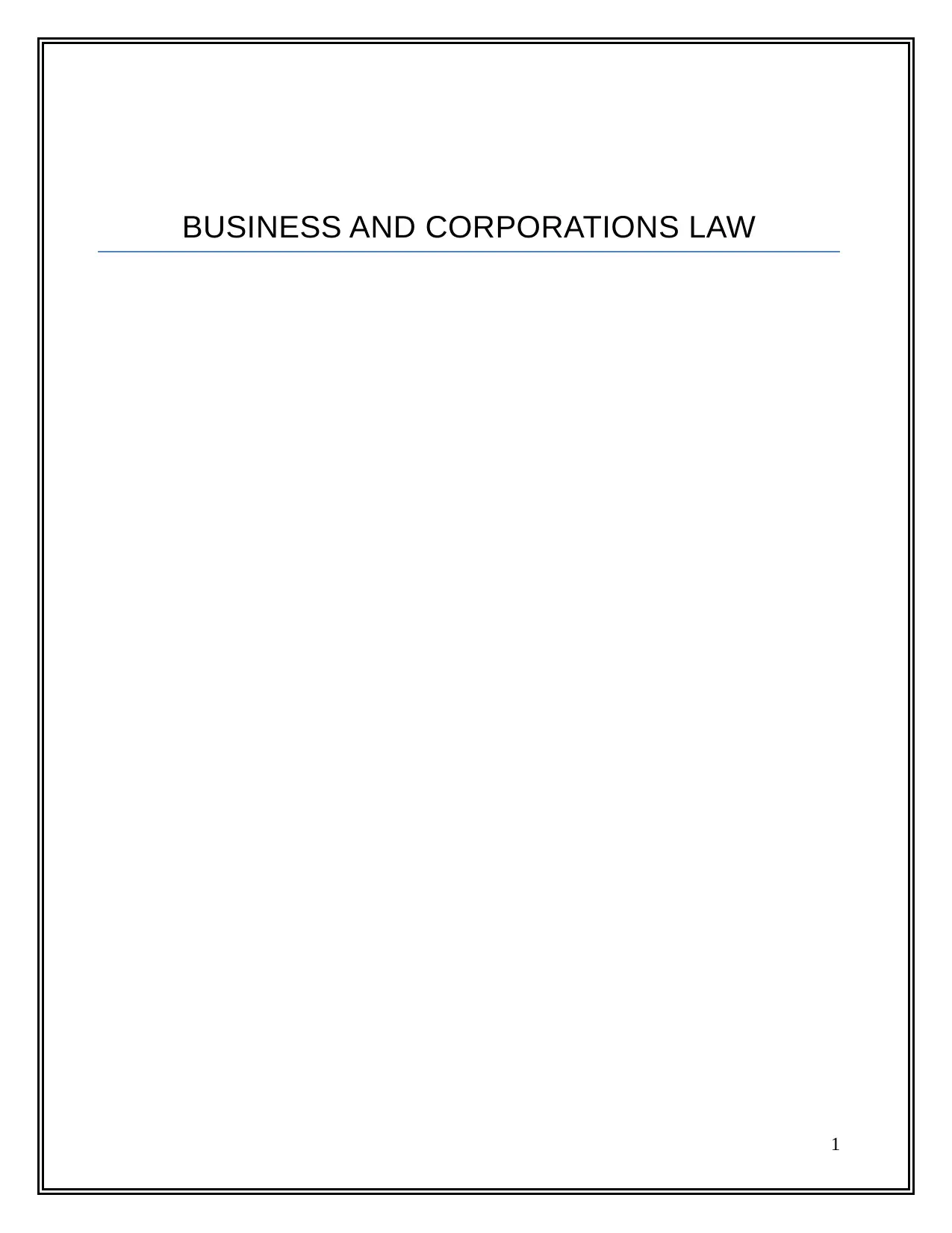
BUSINESS AND CORPORATIONS LAW
1
1
Paraphrase This Document
Need a fresh take? Get an instant paraphrase of this document with our AI Paraphraser
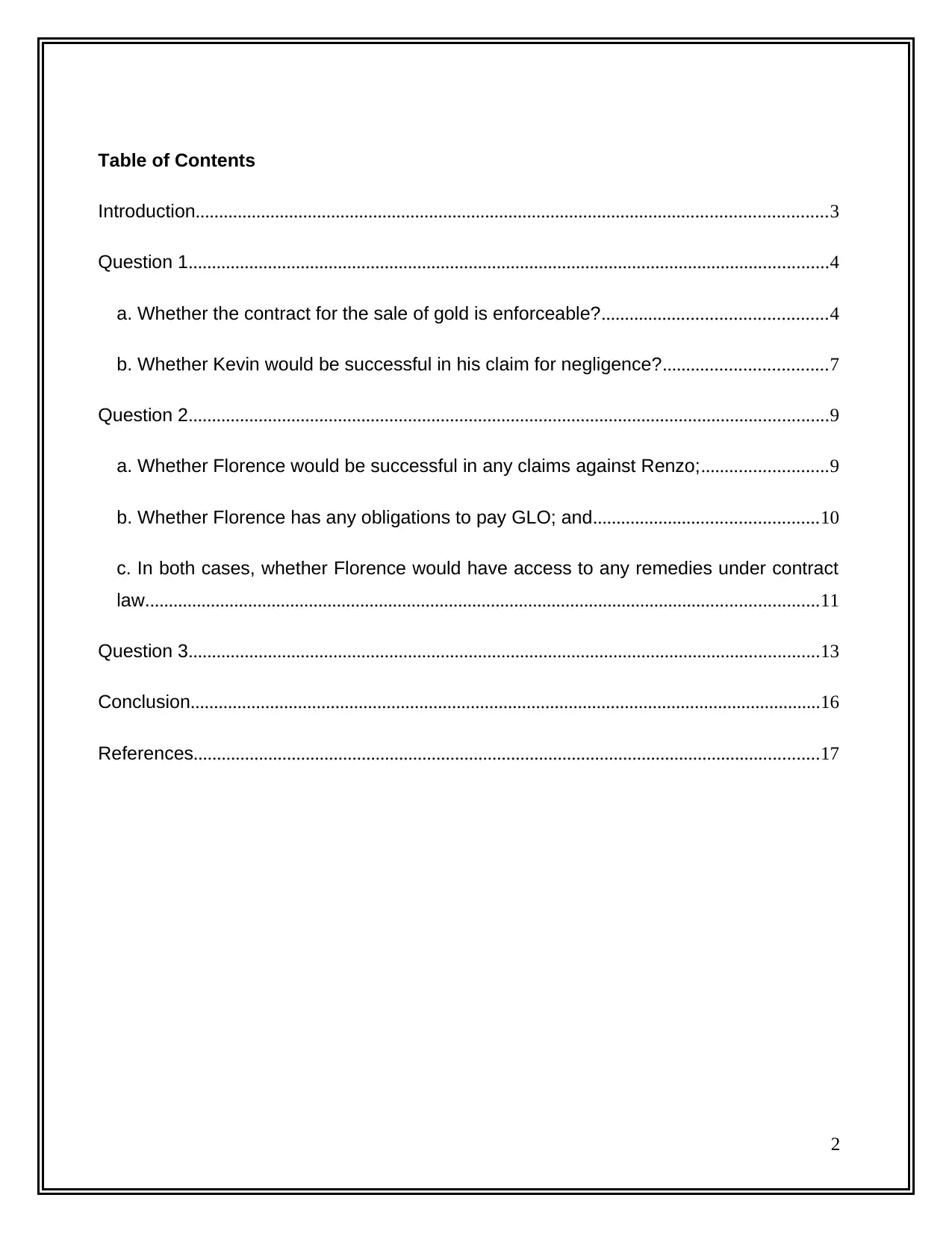
Table of Contents
Introduction.......................................................................................................................................3
Question 1.........................................................................................................................................4
a. Whether the contract for the sale of gold is enforceable?................................................4
b. Whether Kevin would be successful in his claim for negligence?...................................7
Question 2.........................................................................................................................................9
a. Whether Florence would be successful in any claims against Renzo;...........................9
b. Whether Florence has any obligations to pay GLO; and................................................10
c. In both cases, whether Florence would have access to any remedies under contract
law................................................................................................................................................11
Question 3.......................................................................................................................................13
Conclusion.......................................................................................................................................16
References......................................................................................................................................17
2
Introduction.......................................................................................................................................3
Question 1.........................................................................................................................................4
a. Whether the contract for the sale of gold is enforceable?................................................4
b. Whether Kevin would be successful in his claim for negligence?...................................7
Question 2.........................................................................................................................................9
a. Whether Florence would be successful in any claims against Renzo;...........................9
b. Whether Florence has any obligations to pay GLO; and................................................10
c. In both cases, whether Florence would have access to any remedies under contract
law................................................................................................................................................11
Question 3.......................................................................................................................................13
Conclusion.......................................................................................................................................16
References......................................................................................................................................17
2
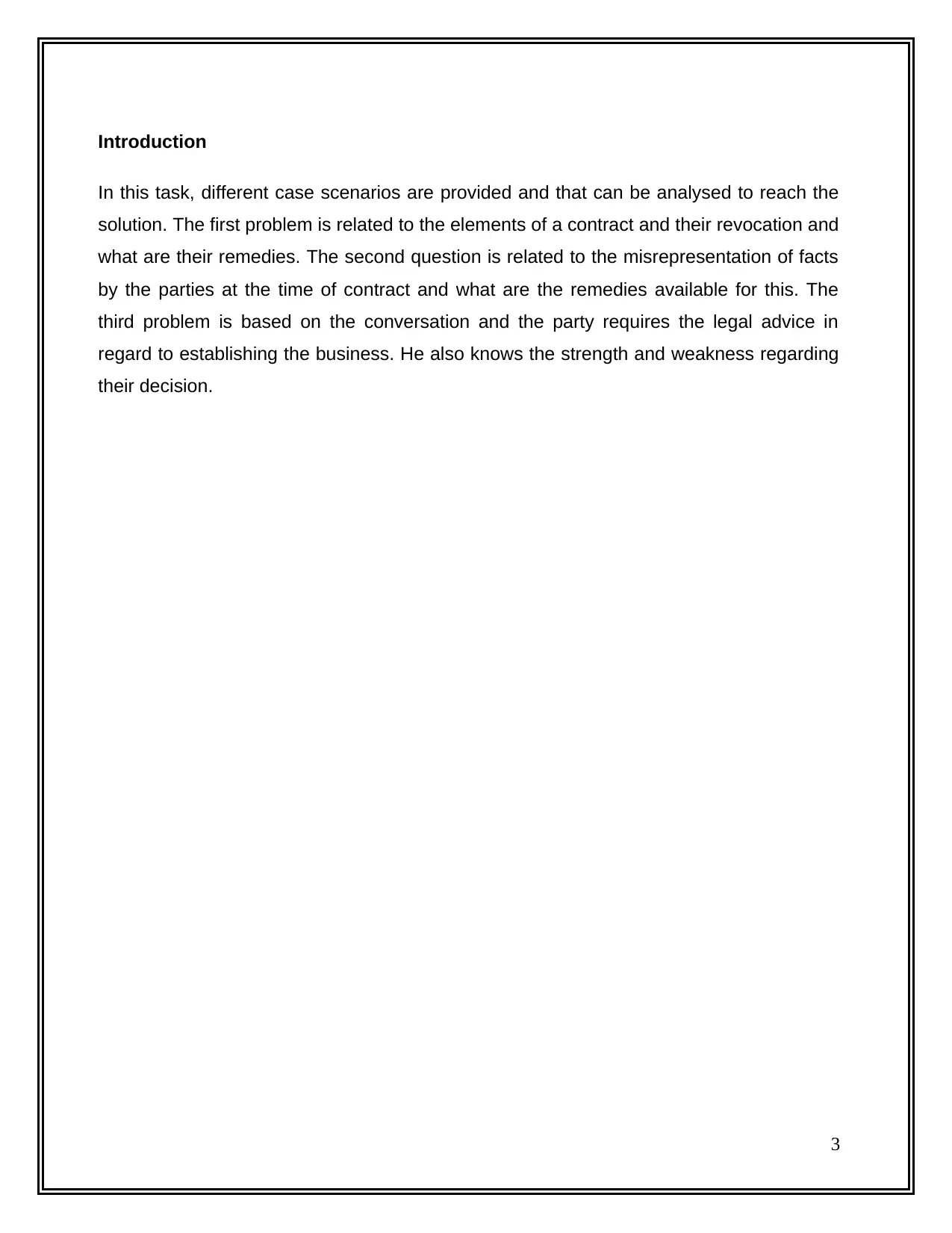
Introduction
In this task, different case scenarios are provided and that can be analysed to reach the
solution. The first problem is related to the elements of a contract and their revocation and
what are their remedies. The second question is related to the misrepresentation of facts
by the parties at the time of contract and what are the remedies available for this. The
third problem is based on the conversation and the party requires the legal advice in
regard to establishing the business. He also knows the strength and weakness regarding
their decision.
3
In this task, different case scenarios are provided and that can be analysed to reach the
solution. The first problem is related to the elements of a contract and their revocation and
what are their remedies. The second question is related to the misrepresentation of facts
by the parties at the time of contract and what are the remedies available for this. The
third problem is based on the conversation and the party requires the legal advice in
regard to establishing the business. He also knows the strength and weakness regarding
their decision.
3
⊘ This is a preview!⊘
Do you want full access?
Subscribe today to unlock all pages.

Trusted by 1+ million students worldwide
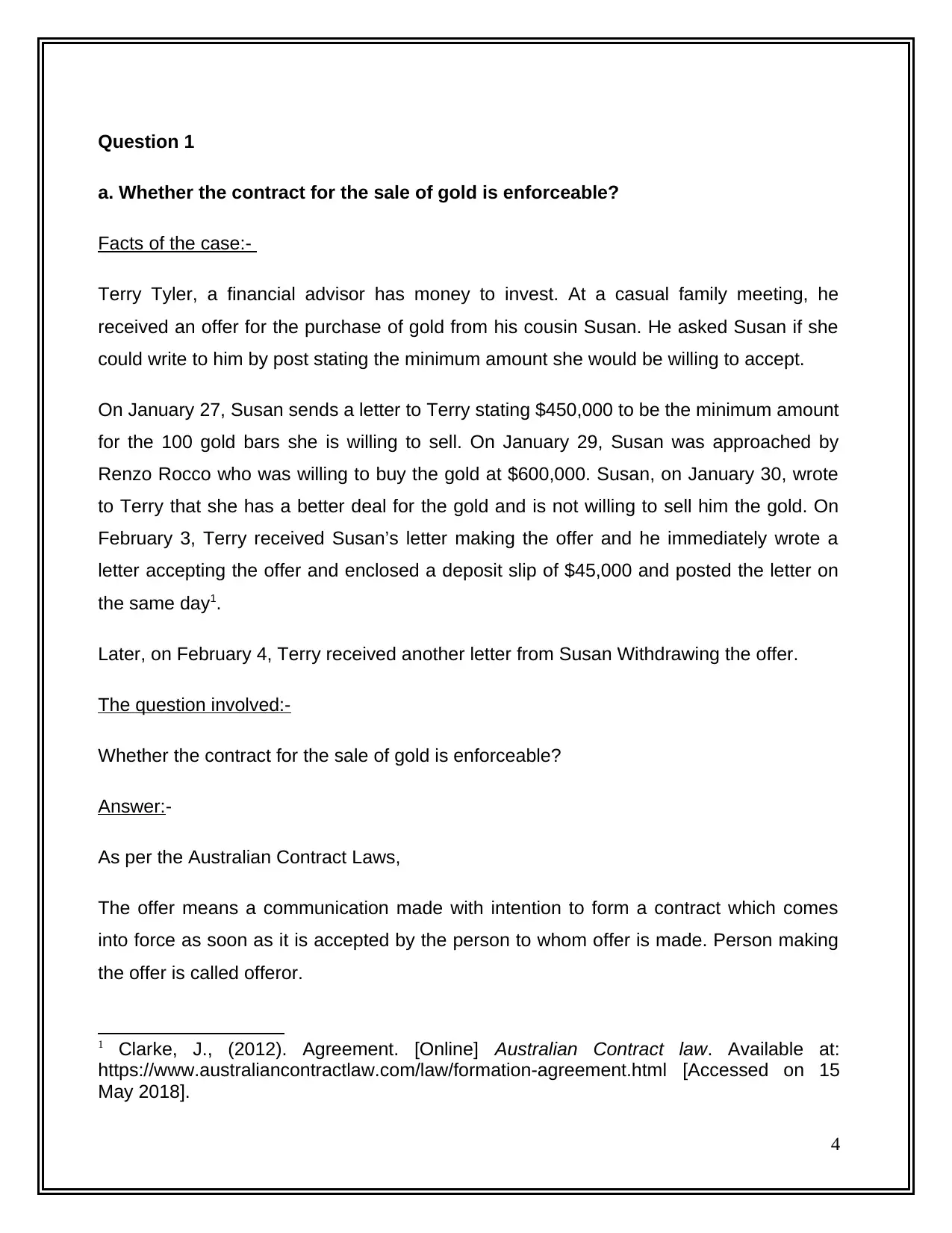
Question 1
a. Whether the contract for the sale of gold is enforceable?
Facts of the case:-
Terry Tyler, a financial advisor has money to invest. At a casual family meeting, he
received an offer for the purchase of gold from his cousin Susan. He asked Susan if she
could write to him by post stating the minimum amount she would be willing to accept.
On January 27, Susan sends a letter to Terry stating $450,000 to be the minimum amount
for the 100 gold bars she is willing to sell. On January 29, Susan was approached by
Renzo Rocco who was willing to buy the gold at $600,000. Susan, on January 30, wrote
to Terry that she has a better deal for the gold and is not willing to sell him the gold. On
February 3, Terry received Susan’s letter making the offer and he immediately wrote a
letter accepting the offer and enclosed a deposit slip of $45,000 and posted the letter on
the same day1.
Later, on February 4, Terry received another letter from Susan Withdrawing the offer.
The question involved:-
Whether the contract for the sale of gold is enforceable?
Answer:-
As per the Australian Contract Laws,
The offer means a communication made with intention to form a contract which comes
into force as soon as it is accepted by the person to whom offer is made. Person making
the offer is called offeror.
1 Clarke, J., (2012). Agreement. [Online] Australian Contract law. Available at:
https://www.australiancontractlaw.com/law/formation-agreement.html [Accessed on 15
May 2018].
4
a. Whether the contract for the sale of gold is enforceable?
Facts of the case:-
Terry Tyler, a financial advisor has money to invest. At a casual family meeting, he
received an offer for the purchase of gold from his cousin Susan. He asked Susan if she
could write to him by post stating the minimum amount she would be willing to accept.
On January 27, Susan sends a letter to Terry stating $450,000 to be the minimum amount
for the 100 gold bars she is willing to sell. On January 29, Susan was approached by
Renzo Rocco who was willing to buy the gold at $600,000. Susan, on January 30, wrote
to Terry that she has a better deal for the gold and is not willing to sell him the gold. On
February 3, Terry received Susan’s letter making the offer and he immediately wrote a
letter accepting the offer and enclosed a deposit slip of $45,000 and posted the letter on
the same day1.
Later, on February 4, Terry received another letter from Susan Withdrawing the offer.
The question involved:-
Whether the contract for the sale of gold is enforceable?
Answer:-
As per the Australian Contract Laws,
The offer means a communication made with intention to form a contract which comes
into force as soon as it is accepted by the person to whom offer is made. Person making
the offer is called offeror.
1 Clarke, J., (2012). Agreement. [Online] Australian Contract law. Available at:
https://www.australiancontractlaw.com/law/formation-agreement.html [Accessed on 15
May 2018].
4
Paraphrase This Document
Need a fresh take? Get an instant paraphrase of this document with our AI Paraphraser
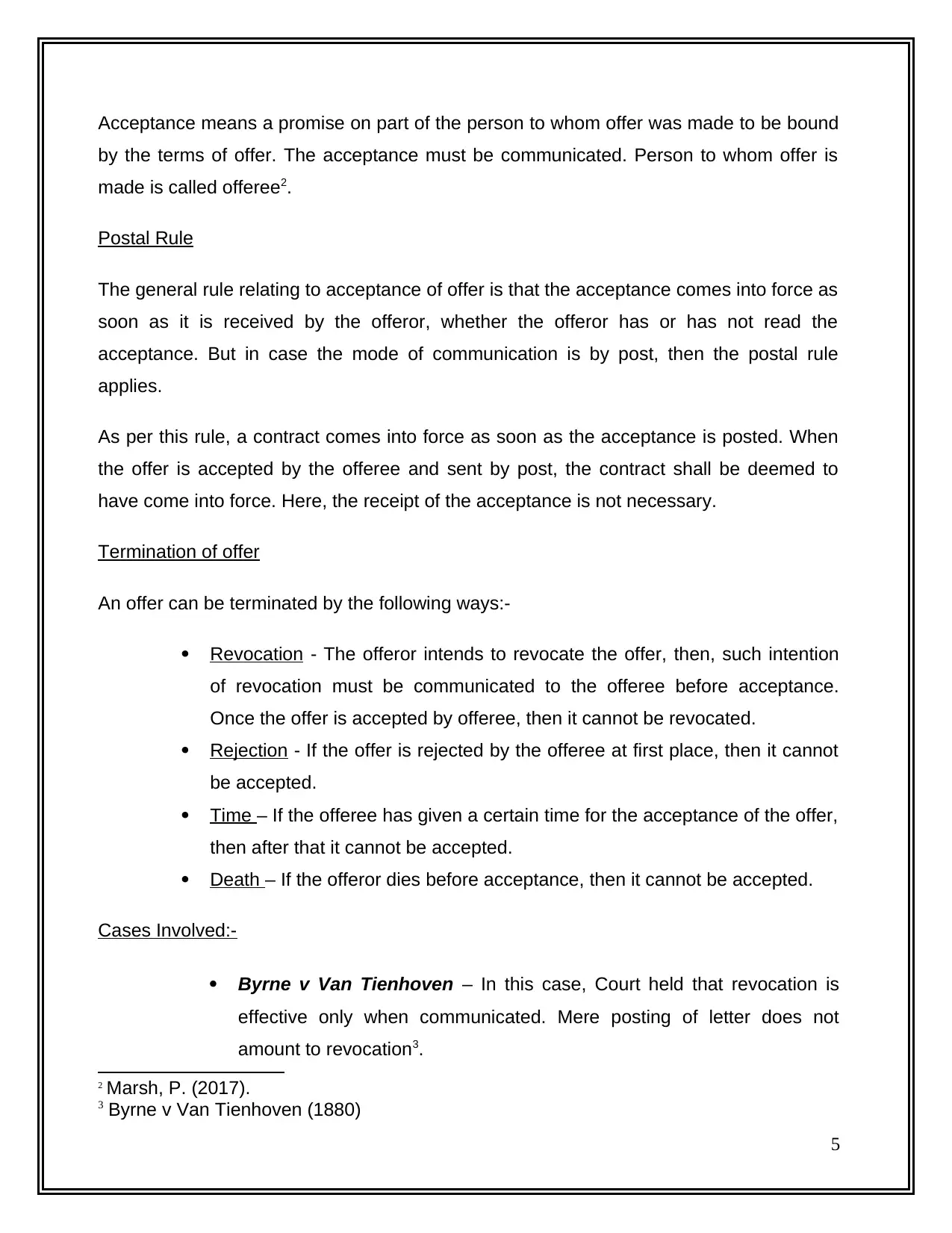
Acceptance means a promise on part of the person to whom offer was made to be bound
by the terms of offer. The acceptance must be communicated. Person to whom offer is
made is called offeree2.
Postal Rule
The general rule relating to acceptance of offer is that the acceptance comes into force as
soon as it is received by the offeror, whether the offeror has or has not read the
acceptance. But in case the mode of communication is by post, then the postal rule
applies.
As per this rule, a contract comes into force as soon as the acceptance is posted. When
the offer is accepted by the offeree and sent by post, the contract shall be deemed to
have come into force. Here, the receipt of the acceptance is not necessary.
Termination of offer
An offer can be terminated by the following ways:-
Revocation - The offeror intends to revocate the offer, then, such intention
of revocation must be communicated to the offeree before acceptance.
Once the offer is accepted by offeree, then it cannot be revocated.
Rejection - If the offer is rejected by the offeree at first place, then it cannot
be accepted.
Time – If the offeree has given a certain time for the acceptance of the offer,
then after that it cannot be accepted.
Death – If the offeror dies before acceptance, then it cannot be accepted.
Cases Involved:-
Byrne v Van Tienhoven – In this case, Court held that revocation is
effective only when communicated. Mere posting of letter does not
amount to revocation3.
2 Marsh, P. (2017).
3 Byrne v Van Tienhoven (1880)
5
by the terms of offer. The acceptance must be communicated. Person to whom offer is
made is called offeree2.
Postal Rule
The general rule relating to acceptance of offer is that the acceptance comes into force as
soon as it is received by the offeror, whether the offeror has or has not read the
acceptance. But in case the mode of communication is by post, then the postal rule
applies.
As per this rule, a contract comes into force as soon as the acceptance is posted. When
the offer is accepted by the offeree and sent by post, the contract shall be deemed to
have come into force. Here, the receipt of the acceptance is not necessary.
Termination of offer
An offer can be terminated by the following ways:-
Revocation - The offeror intends to revocate the offer, then, such intention
of revocation must be communicated to the offeree before acceptance.
Once the offer is accepted by offeree, then it cannot be revocated.
Rejection - If the offer is rejected by the offeree at first place, then it cannot
be accepted.
Time – If the offeree has given a certain time for the acceptance of the offer,
then after that it cannot be accepted.
Death – If the offeror dies before acceptance, then it cannot be accepted.
Cases Involved:-
Byrne v Van Tienhoven – In this case, Court held that revocation is
effective only when communicated. Mere posting of letter does not
amount to revocation3.
2 Marsh, P. (2017).
3 Byrne v Van Tienhoven (1880)
5
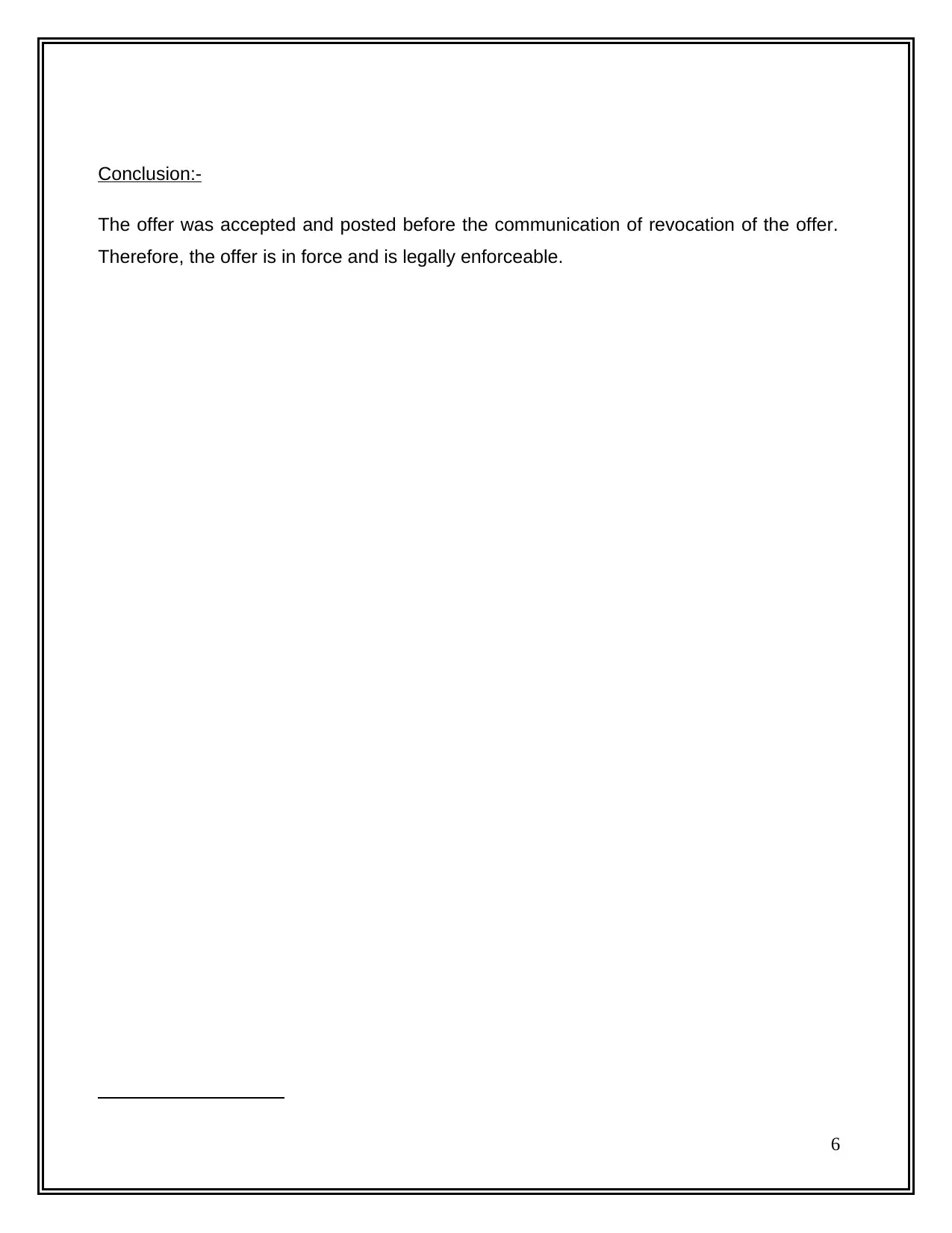
Conclusion:-
The offer was accepted and posted before the communication of revocation of the offer.
Therefore, the offer is in force and is legally enforceable.
6
The offer was accepted and posted before the communication of revocation of the offer.
Therefore, the offer is in force and is legally enforceable.
6
⊘ This is a preview!⊘
Do you want full access?
Subscribe today to unlock all pages.

Trusted by 1+ million students worldwide
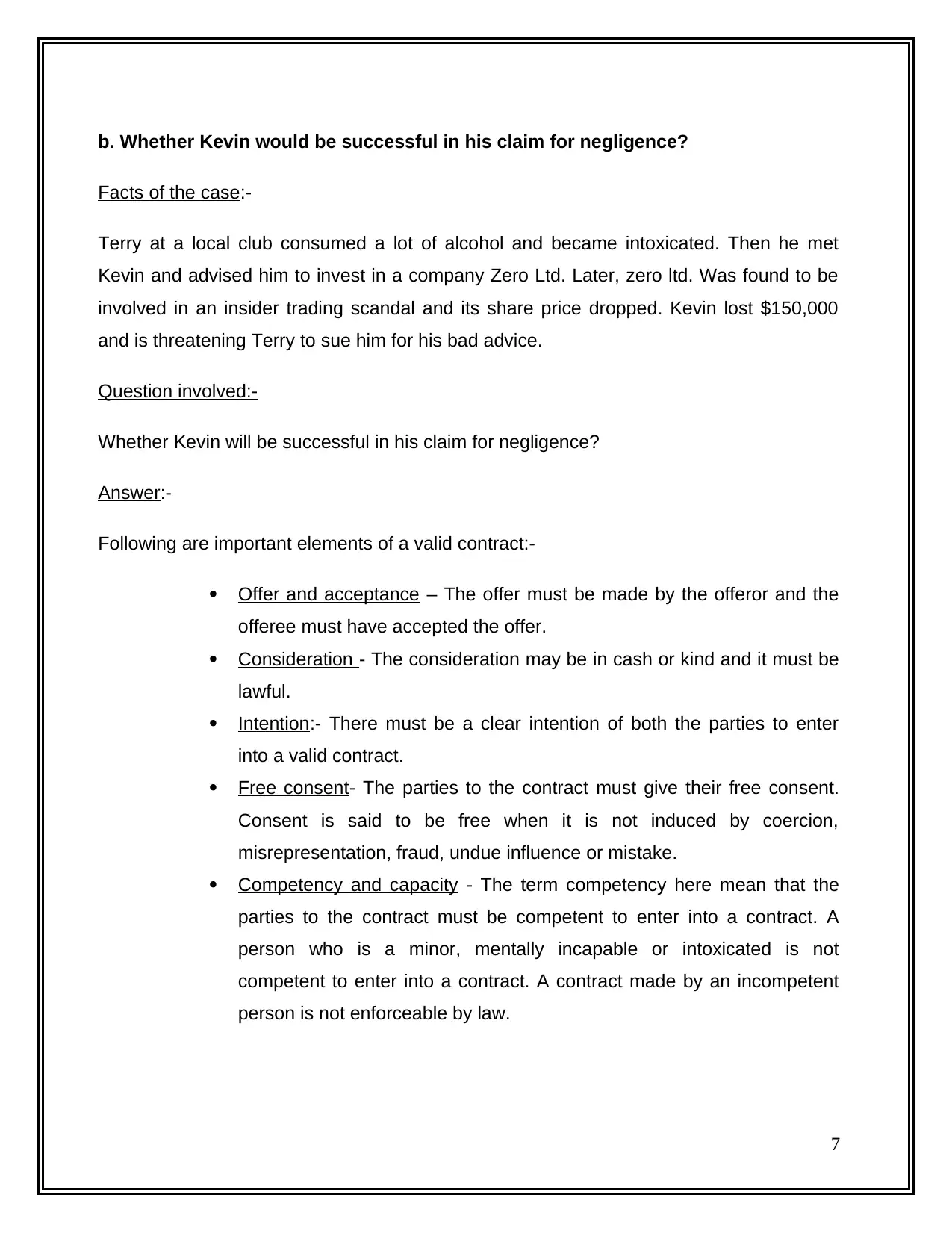
b. Whether Kevin would be successful in his claim for negligence?
Facts of the case:-
Terry at a local club consumed a lot of alcohol and became intoxicated. Then he met
Kevin and advised him to invest in a company Zero Ltd. Later, zero ltd. Was found to be
involved in an insider trading scandal and its share price dropped. Kevin lost $150,000
and is threatening Terry to sue him for his bad advice.
Question involved:-
Whether Kevin will be successful in his claim for negligence?
Answer:-
Following are important elements of a valid contract:-
Offer and acceptance – The offer must be made by the offeror and the
offeree must have accepted the offer.
Consideration - The consideration may be in cash or kind and it must be
lawful.
Intention:- There must be a clear intention of both the parties to enter
into a valid contract.
Free consent- The parties to the contract must give their free consent.
Consent is said to be free when it is not induced by coercion,
misrepresentation, fraud, undue influence or mistake.
Competency and capacity - The term competency here mean that the
parties to the contract must be competent to enter into a contract. A
person who is a minor, mentally incapable or intoxicated is not
competent to enter into a contract. A contract made by an incompetent
person is not enforceable by law.
7
Facts of the case:-
Terry at a local club consumed a lot of alcohol and became intoxicated. Then he met
Kevin and advised him to invest in a company Zero Ltd. Later, zero ltd. Was found to be
involved in an insider trading scandal and its share price dropped. Kevin lost $150,000
and is threatening Terry to sue him for his bad advice.
Question involved:-
Whether Kevin will be successful in his claim for negligence?
Answer:-
Following are important elements of a valid contract:-
Offer and acceptance – The offer must be made by the offeror and the
offeree must have accepted the offer.
Consideration - The consideration may be in cash or kind and it must be
lawful.
Intention:- There must be a clear intention of both the parties to enter
into a valid contract.
Free consent- The parties to the contract must give their free consent.
Consent is said to be free when it is not induced by coercion,
misrepresentation, fraud, undue influence or mistake.
Competency and capacity - The term competency here mean that the
parties to the contract must be competent to enter into a contract. A
person who is a minor, mentally incapable or intoxicated is not
competent to enter into a contract. A contract made by an incompetent
person is not enforceable by law.
7
Paraphrase This Document
Need a fresh take? Get an instant paraphrase of this document with our AI Paraphraser
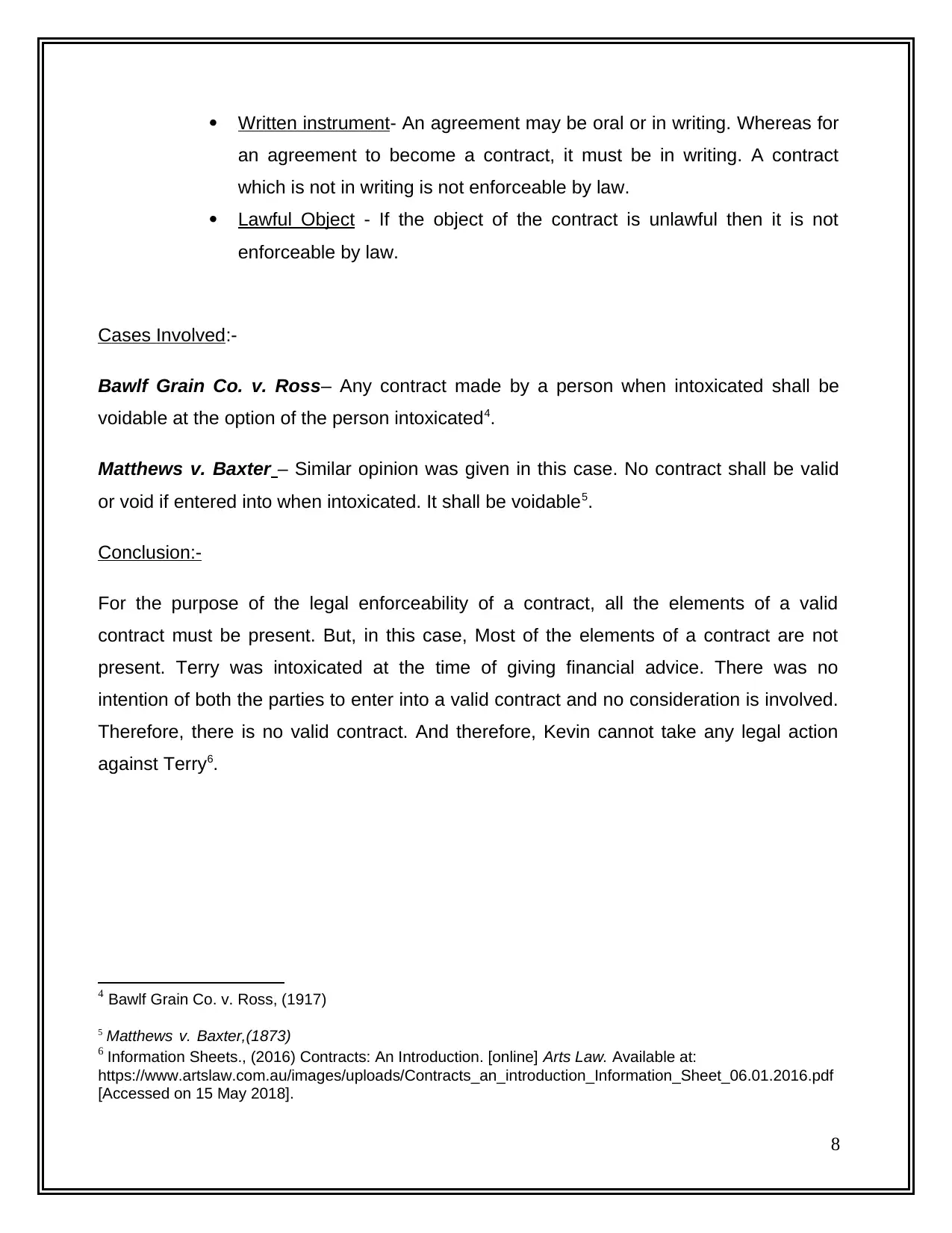
Written instrument- An agreement may be oral or in writing. Whereas for
an agreement to become a contract, it must be in writing. A contract
which is not in writing is not enforceable by law.
Lawful Object - If the object of the contract is unlawful then it is not
enforceable by law.
Cases Involved:-
Bawlf Grain Co. v. Ross– Any contract made by a person when intoxicated shall be
voidable at the option of the person intoxicated4.
Matthews v. Baxter – Similar opinion was given in this case. No contract shall be valid
or void if entered into when intoxicated. It shall be voidable5.
Conclusion:-
For the purpose of the legal enforceability of a contract, all the elements of a valid
contract must be present. But, in this case, Most of the elements of a contract are not
present. Terry was intoxicated at the time of giving financial advice. There was no
intention of both the parties to enter into a valid contract and no consideration is involved.
Therefore, there is no valid contract. And therefore, Kevin cannot take any legal action
against Terry6.
4 Bawlf Grain Co. v. Ross, (1917)
5 Matthews v. Baxter,(1873)
6 Information Sheets., (2016) Contracts: An Introduction. [online] Arts Law. Available at:
https://www.artslaw.com.au/images/uploads/Contracts_an_introduction_Information_Sheet_06.01.2016.pdf
[Accessed on 15 May 2018].
8
an agreement to become a contract, it must be in writing. A contract
which is not in writing is not enforceable by law.
Lawful Object - If the object of the contract is unlawful then it is not
enforceable by law.
Cases Involved:-
Bawlf Grain Co. v. Ross– Any contract made by a person when intoxicated shall be
voidable at the option of the person intoxicated4.
Matthews v. Baxter – Similar opinion was given in this case. No contract shall be valid
or void if entered into when intoxicated. It shall be voidable5.
Conclusion:-
For the purpose of the legal enforceability of a contract, all the elements of a valid
contract must be present. But, in this case, Most of the elements of a contract are not
present. Terry was intoxicated at the time of giving financial advice. There was no
intention of both the parties to enter into a valid contract and no consideration is involved.
Therefore, there is no valid contract. And therefore, Kevin cannot take any legal action
against Terry6.
4 Bawlf Grain Co. v. Ross, (1917)
5 Matthews v. Baxter,(1873)
6 Information Sheets., (2016) Contracts: An Introduction. [online] Arts Law. Available at:
https://www.artslaw.com.au/images/uploads/Contracts_an_introduction_Information_Sheet_06.01.2016.pdf
[Accessed on 15 May 2018].
8
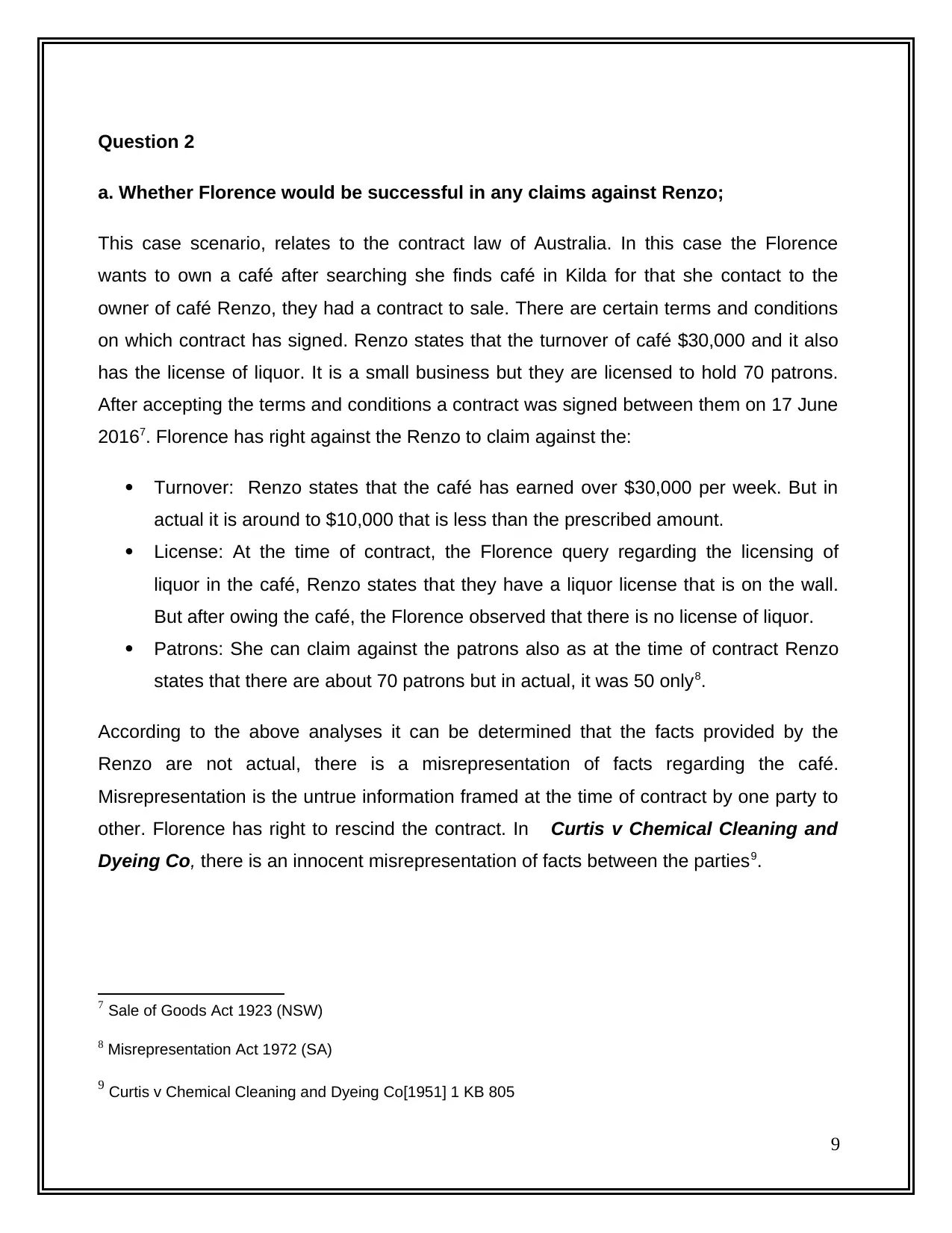
Question 2
a. Whether Florence would be successful in any claims against Renzo;
This case scenario, relates to the contract law of Australia. In this case the Florence
wants to own a café after searching she finds café in Kilda for that she contact to the
owner of café Renzo, they had a contract to sale. There are certain terms and conditions
on which contract has signed. Renzo states that the turnover of café $30,000 and it also
has the license of liquor. It is a small business but they are licensed to hold 70 patrons.
After accepting the terms and conditions a contract was signed between them on 17 June
20167. Florence has right against the Renzo to claim against the:
Turnover: Renzo states that the café has earned over $30,000 per week. But in
actual it is around to $10,000 that is less than the prescribed amount.
License: At the time of contract, the Florence query regarding the licensing of
liquor in the café, Renzo states that they have a liquor license that is on the wall.
But after owing the café, the Florence observed that there is no license of liquor.
Patrons: She can claim against the patrons also as at the time of contract Renzo
states that there are about 70 patrons but in actual, it was 50 only8.
According to the above analyses it can be determined that the facts provided by the
Renzo are not actual, there is a misrepresentation of facts regarding the café.
Misrepresentation is the untrue information framed at the time of contract by one party to
other. Florence has right to rescind the contract. In Curtis v Chemical Cleaning and
Dyeing Co, there is an innocent misrepresentation of facts between the parties9.
7 Sale of Goods Act 1923 (NSW)
8 Misrepresentation Act 1972 (SA)
9 Curtis v Chemical Cleaning and Dyeing Co[1951] 1 KB 805
9
a. Whether Florence would be successful in any claims against Renzo;
This case scenario, relates to the contract law of Australia. In this case the Florence
wants to own a café after searching she finds café in Kilda for that she contact to the
owner of café Renzo, they had a contract to sale. There are certain terms and conditions
on which contract has signed. Renzo states that the turnover of café $30,000 and it also
has the license of liquor. It is a small business but they are licensed to hold 70 patrons.
After accepting the terms and conditions a contract was signed between them on 17 June
20167. Florence has right against the Renzo to claim against the:
Turnover: Renzo states that the café has earned over $30,000 per week. But in
actual it is around to $10,000 that is less than the prescribed amount.
License: At the time of contract, the Florence query regarding the licensing of
liquor in the café, Renzo states that they have a liquor license that is on the wall.
But after owing the café, the Florence observed that there is no license of liquor.
Patrons: She can claim against the patrons also as at the time of contract Renzo
states that there are about 70 patrons but in actual, it was 50 only8.
According to the above analyses it can be determined that the facts provided by the
Renzo are not actual, there is a misrepresentation of facts regarding the café.
Misrepresentation is the untrue information framed at the time of contract by one party to
other. Florence has right to rescind the contract. In Curtis v Chemical Cleaning and
Dyeing Co, there is an innocent misrepresentation of facts between the parties9.
7 Sale of Goods Act 1923 (NSW)
8 Misrepresentation Act 1972 (SA)
9 Curtis v Chemical Cleaning and Dyeing Co[1951] 1 KB 805
9
⊘ This is a preview!⊘
Do you want full access?
Subscribe today to unlock all pages.

Trusted by 1+ million students worldwide
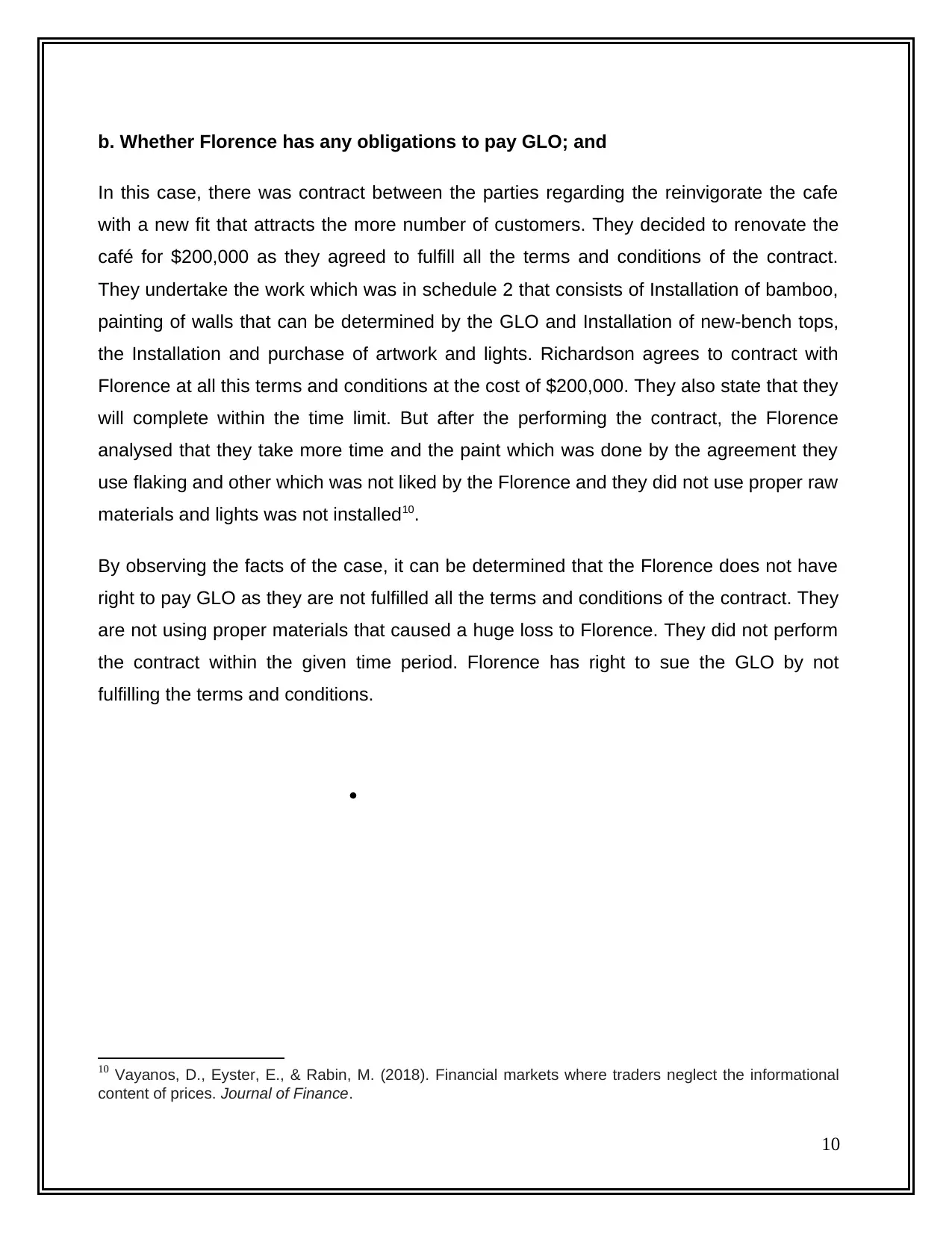
b. Whether Florence has any obligations to pay GLO; and
In this case, there was contract between the parties regarding the reinvigorate the cafe
with a new fit that attracts the more number of customers. They decided to renovate the
café for $200,000 as they agreed to fulfill all the terms and conditions of the contract.
They undertake the work which was in schedule 2 that consists of Installation of bamboo,
painting of walls that can be determined by the GLO and Installation of new-bench tops,
the Installation and purchase of artwork and lights. Richardson agrees to contract with
Florence at all this terms and conditions at the cost of $200,000. They also state that they
will complete within the time limit. But after the performing the contract, the Florence
analysed that they take more time and the paint which was done by the agreement they
use flaking and other which was not liked by the Florence and they did not use proper raw
materials and lights was not installed10.
By observing the facts of the case, it can be determined that the Florence does not have
right to pay GLO as they are not fulfilled all the terms and conditions of the contract. They
are not using proper materials that caused a huge loss to Florence. They did not perform
the contract within the given time period. Florence has right to sue the GLO by not
fulfilling the terms and conditions.
10 Vayanos, D., Eyster, E., & Rabin, M. (2018). Financial markets where traders neglect the informational
content of prices. Journal of Finance.
10
In this case, there was contract between the parties regarding the reinvigorate the cafe
with a new fit that attracts the more number of customers. They decided to renovate the
café for $200,000 as they agreed to fulfill all the terms and conditions of the contract.
They undertake the work which was in schedule 2 that consists of Installation of bamboo,
painting of walls that can be determined by the GLO and Installation of new-bench tops,
the Installation and purchase of artwork and lights. Richardson agrees to contract with
Florence at all this terms and conditions at the cost of $200,000. They also state that they
will complete within the time limit. But after the performing the contract, the Florence
analysed that they take more time and the paint which was done by the agreement they
use flaking and other which was not liked by the Florence and they did not use proper raw
materials and lights was not installed10.
By observing the facts of the case, it can be determined that the Florence does not have
right to pay GLO as they are not fulfilled all the terms and conditions of the contract. They
are not using proper materials that caused a huge loss to Florence. They did not perform
the contract within the given time period. Florence has right to sue the GLO by not
fulfilling the terms and conditions.
10 Vayanos, D., Eyster, E., & Rabin, M. (2018). Financial markets where traders neglect the informational
content of prices. Journal of Finance.
10
Paraphrase This Document
Need a fresh take? Get an instant paraphrase of this document with our AI Paraphraser
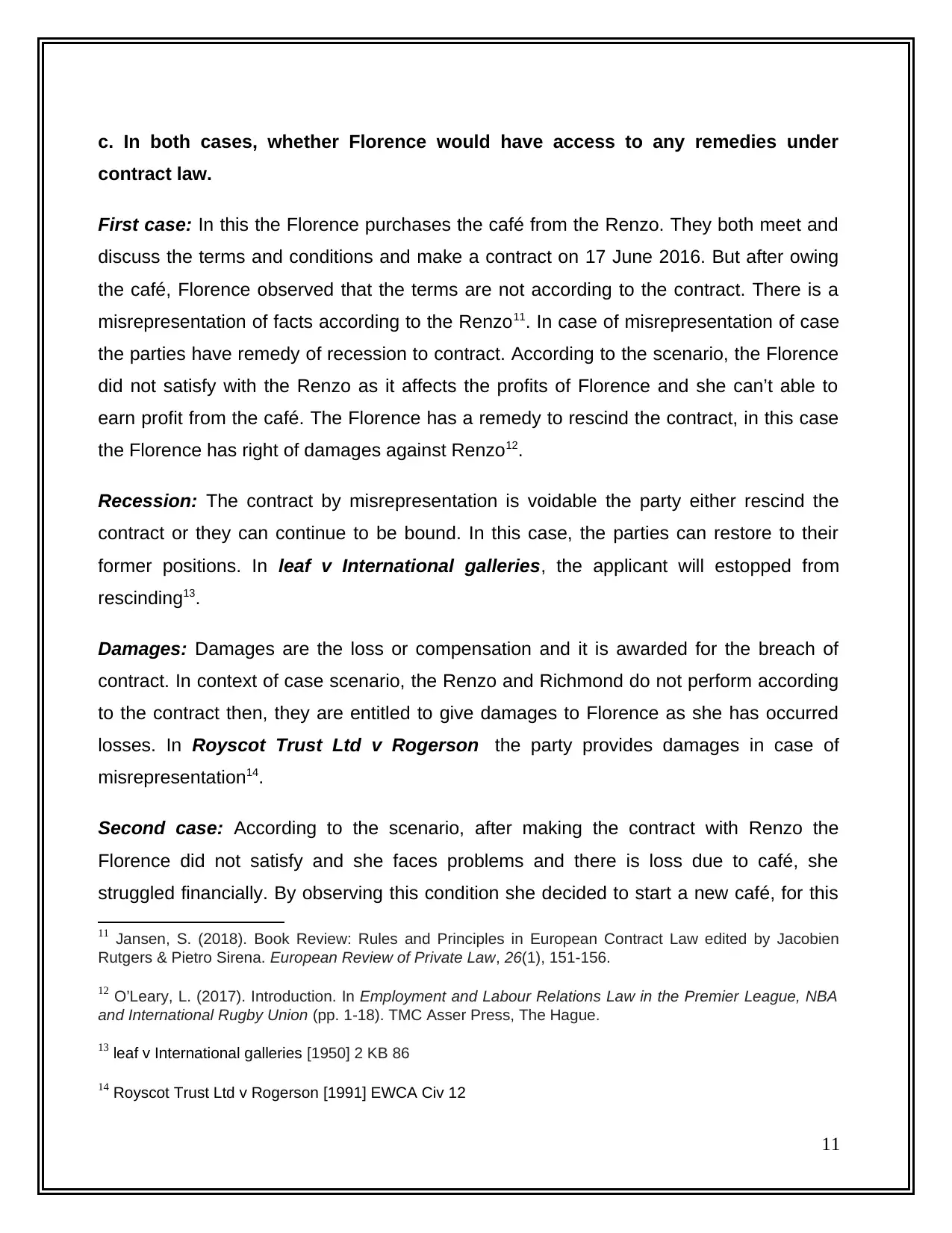
c. In both cases, whether Florence would have access to any remedies under
contract law.
First case: In this the Florence purchases the café from the Renzo. They both meet and
discuss the terms and conditions and make a contract on 17 June 2016. But after owing
the café, Florence observed that the terms are not according to the contract. There is a
misrepresentation of facts according to the Renzo11. In case of misrepresentation of case
the parties have remedy of recession to contract. According to the scenario, the Florence
did not satisfy with the Renzo as it affects the profits of Florence and she can’t able to
earn profit from the café. The Florence has a remedy to rescind the contract, in this case
the Florence has right of damages against Renzo12.
Recession: The contract by misrepresentation is voidable the party either rescind the
contract or they can continue to be bound. In this case, the parties can restore to their
former positions. In leaf v International galleries, the applicant will estopped from
rescinding13.
Damages: Damages are the loss or compensation and it is awarded for the breach of
contract. In context of case scenario, the Renzo and Richmond do not perform according
to the contract then, they are entitled to give damages to Florence as she has occurred
losses. In Royscot Trust Ltd v Rogerson the party provides damages in case of
misrepresentation14.
Second case: According to the scenario, after making the contract with Renzo the
Florence did not satisfy and she faces problems and there is loss due to café, she
struggled financially. By observing this condition she decided to start a new café, for this
11 Jansen, S. (2018). Book Review: Rules and Principles in European Contract Law edited by Jacobien
Rutgers & Pietro Sirena. European Review of Private Law, 26(1), 151-156.
12 O’Leary, L. (2017). Introduction. In Employment and Labour Relations Law in the Premier League, NBA
and International Rugby Union (pp. 1-18). TMC Asser Press, The Hague.
13 leaf v International galleries [1950] 2 KB 86
14 Royscot Trust Ltd v Rogerson [1991] EWCA Civ 12
11
contract law.
First case: In this the Florence purchases the café from the Renzo. They both meet and
discuss the terms and conditions and make a contract on 17 June 2016. But after owing
the café, Florence observed that the terms are not according to the contract. There is a
misrepresentation of facts according to the Renzo11. In case of misrepresentation of case
the parties have remedy of recession to contract. According to the scenario, the Florence
did not satisfy with the Renzo as it affects the profits of Florence and she can’t able to
earn profit from the café. The Florence has a remedy to rescind the contract, in this case
the Florence has right of damages against Renzo12.
Recession: The contract by misrepresentation is voidable the party either rescind the
contract or they can continue to be bound. In this case, the parties can restore to their
former positions. In leaf v International galleries, the applicant will estopped from
rescinding13.
Damages: Damages are the loss or compensation and it is awarded for the breach of
contract. In context of case scenario, the Renzo and Richmond do not perform according
to the contract then, they are entitled to give damages to Florence as she has occurred
losses. In Royscot Trust Ltd v Rogerson the party provides damages in case of
misrepresentation14.
Second case: According to the scenario, after making the contract with Renzo the
Florence did not satisfy and she faces problems and there is loss due to café, she
struggled financially. By observing this condition she decided to start a new café, for this
11 Jansen, S. (2018). Book Review: Rules and Principles in European Contract Law edited by Jacobien
Rutgers & Pietro Sirena. European Review of Private Law, 26(1), 151-156.
12 O’Leary, L. (2017). Introduction. In Employment and Labour Relations Law in the Premier League, NBA
and International Rugby Union (pp. 1-18). TMC Asser Press, The Hague.
13 leaf v International galleries [1950] 2 KB 86
14 Royscot Trust Ltd v Rogerson [1991] EWCA Civ 12
11
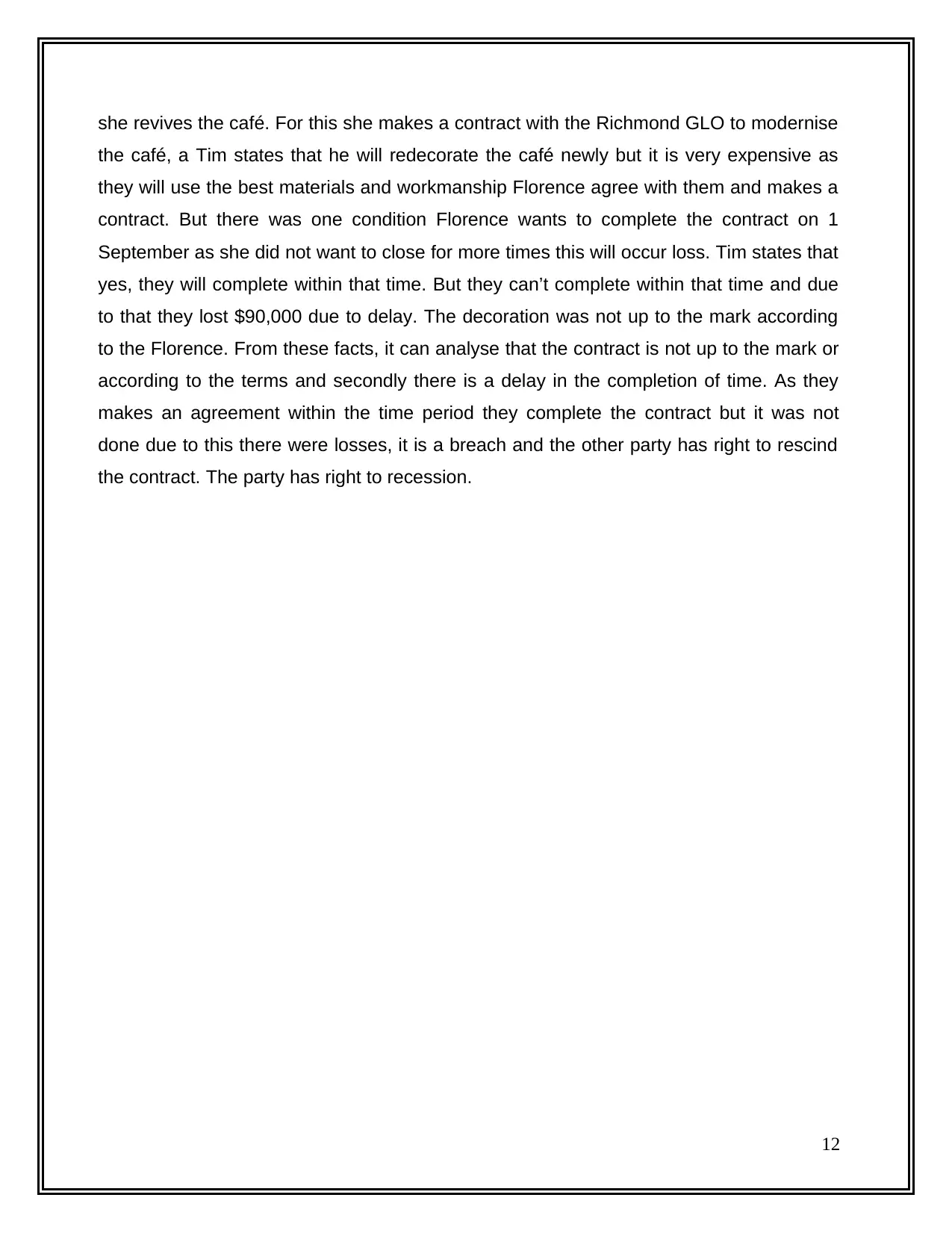
she revives the café. For this she makes a contract with the Richmond GLO to modernise
the café, a Tim states that he will redecorate the café newly but it is very expensive as
they will use the best materials and workmanship Florence agree with them and makes a
contract. But there was one condition Florence wants to complete the contract on 1
September as she did not want to close for more times this will occur loss. Tim states that
yes, they will complete within that time. But they can’t complete within that time and due
to that they lost $90,000 due to delay. The decoration was not up to the mark according
to the Florence. From these facts, it can analyse that the contract is not up to the mark or
according to the terms and secondly there is a delay in the completion of time. As they
makes an agreement within the time period they complete the contract but it was not
done due to this there were losses, it is a breach and the other party has right to rescind
the contract. The party has right to recession.
12
the café, a Tim states that he will redecorate the café newly but it is very expensive as
they will use the best materials and workmanship Florence agree with them and makes a
contract. But there was one condition Florence wants to complete the contract on 1
September as she did not want to close for more times this will occur loss. Tim states that
yes, they will complete within that time. But they can’t complete within that time and due
to that they lost $90,000 due to delay. The decoration was not up to the mark according
to the Florence. From these facts, it can analyse that the contract is not up to the mark or
according to the terms and secondly there is a delay in the completion of time. As they
makes an agreement within the time period they complete the contract but it was not
done due to this there were losses, it is a breach and the other party has right to rescind
the contract. The party has right to recession.
12
⊘ This is a preview!⊘
Do you want full access?
Subscribe today to unlock all pages.

Trusted by 1+ million students worldwide
1 out of 18
Related Documents
Your All-in-One AI-Powered Toolkit for Academic Success.
+13062052269
info@desklib.com
Available 24*7 on WhatsApp / Email
![[object Object]](/_next/static/media/star-bottom.7253800d.svg)
Unlock your academic potential
Copyright © 2020–2026 A2Z Services. All Rights Reserved. Developed and managed by ZUCOL.





